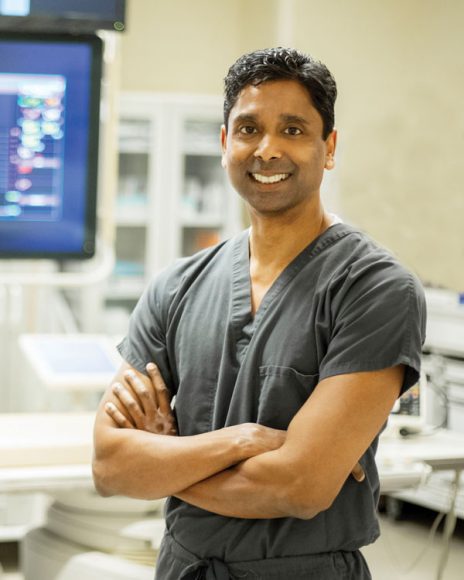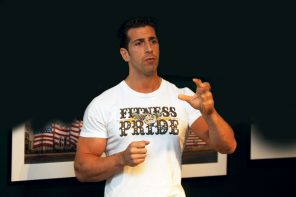Srihari S. Naidu knew he wanted to become a doctor from an early age, following in the footsteps of his father, who was an esteemed cardiologist.
“I loved the fact that he had great relationships with his patients and had a tremendous work ethic. I really wanted to emulate him,” says Naidu, a native of Scarsdale who lives in Manhattan.
Naidu is now director of the cardiac catheterization laboratories and of the hypertrophic cardiomyopathy program at Westchester Medical Center in Valhalla. He is a world-renowned interventional cardiology expert in minimally invasive treatments of heart disease.
His path leading to his field of expertise started at Brown University, where he attended college and medical school.
“I wasn’t sure what I wanted to do, but I soon discovered that cardiology was a field where you could use your brain to diagnose problems and your hands to be technically astute to try to fix things.”
Naidu then went to NewYork-Presbyterian/Weill Cornell Medical Center for his residency and attended the Perelman School of Medicine at the University of Pennsylvania for a cardiology fellowship. While at the University of Pennsylvania, Naidu first thought that he wanted to become a heart transplant doctor, but changed his mind after doing his rotation in interventional cardiology.
“Interventional cardiology is a field where doctors use catheters to reach different areas of the heart, from blockages of the arteries to holes in the heart to valves that have gotten rusty or tight over time. As opposed to open-heart surgery, interventional methods imply that you are using minimally invasive methods to intervene on the heart.”
Naidu is recognized as one of the leading interventional cardiology experts in treating hypertrophic cardiomyopathy, a disease in which the heart muscle becomes abnormally thick. “The disease is basically genetic, but it doesn’t usually trigger a problem until at least your teenage years, if not, during your 20s to 40s. Some parts of the heart wall get so thick that they bulge in and block the aortic valve and that causes an obstruction.”
Patients who have this disease tend to experience shortness of breath, often pass out or have arrhythmias, where the heart goes very fast. This is a major reason why some young athletes die suddenly because their hearts beat too fast to sustain life, typically when overexercising.
Later in life the muscle problem causes more heart failure, with patients not being able to circulate enough blood. This makes them tired, dizzy and likely to experience shortness of breath.
“This is a condition where there was not much you could do to treat it without open heart surgery until 20 years ago when they came up with a procedure called alcohol septal ablasion,” Naidu says.
Alcohol septal ablasion uses a catheter to get into the arteries of the heart and find the small artery that is going to the affected muscle. “We are using 100 percent alcohol, which is directly toxic to heart muscle, to infuse the area that’s too thick and basically shrink it down.
“The University of Pennsylvania was one of the few places in the country where they were doing this procedure, so I learned it back in 2004. When I took my first job at NewYork-Presbyterian/Weill Cornell Medical Center, they had never done one, so I started getting patients and it evolved from there because I was ahead of the curve.”
Naidu developed the hypertrophic cardiomyopathy treatment center at Cornell, performing their first series of alcohol septal ablations. He then grew it to more than 800 patients and more than 130 alcohol ablations at NYU Winthrop Hospital on Long Island.
According to Naidu, it wasn’t until he brought the program to Westchester Medical Center in 2016 that it truly blossomed. Working with Julio Panza, the chief of cardiology, Naidu now oversees a center where they perform some 25 to 30 alcohol septal ablations a year.
Both Naidu and Panza shared the vision that the medical center could become a mecca for treating hypertrophic cardiomyopathy. “Patients come not only from the tristate area but from as far away as Oklahoma, Idaho and Seattle,” Naidu says. In addition to the alcohol septal ablations, the center is able to offer other options to correct the condition, depending on what is best for the patient. Other treatments include medical therapy, device placement, open-heart surgery and heart transplantation.
Among the many other reasons patients come to see Naidu is because he is one of the leading experts in treating young stroke patients with a condition called patent foramen ovale (PFO), a hole in the heart that people are born with. “Everyone is born with that hole, which allows blood and food to get from mother to child before the baby is born. When babies are born, 80 percent of the holes close up and 20 percent stay open.”
Those people in whom the hole does not close are at higher risk for a number of diseases, including stroke, migraines and other conditions such as high-altitude sickness.
“We’ve done a series of trials over the last 10 years and several have shown that if a young person, less than age 55, has a stroke and you close that hole, you reduce the risk of a second stroke by 75 to 80 percent,” Naidu says.
During the procedure patients are awake and catheters go through their legs and up into their heart. “One is a tiny ultrasound that sits in the heart and looks at the hole. Through the other leg, we thread up wire and put in a disc-like device with wire mesh that closes the hole,” he explains.
Naidu has been doing this procedure for strokes since 2004, but it wasn’t formally approved in a large-scale way until two years ago. “I’ve done about 200 PFO closures in the past 15 years, and I haven’t had a single patient who’s had a second stroke. That procedure has really revolutionized stroke management in young people.”
For more, visit naiducardiology.com.




